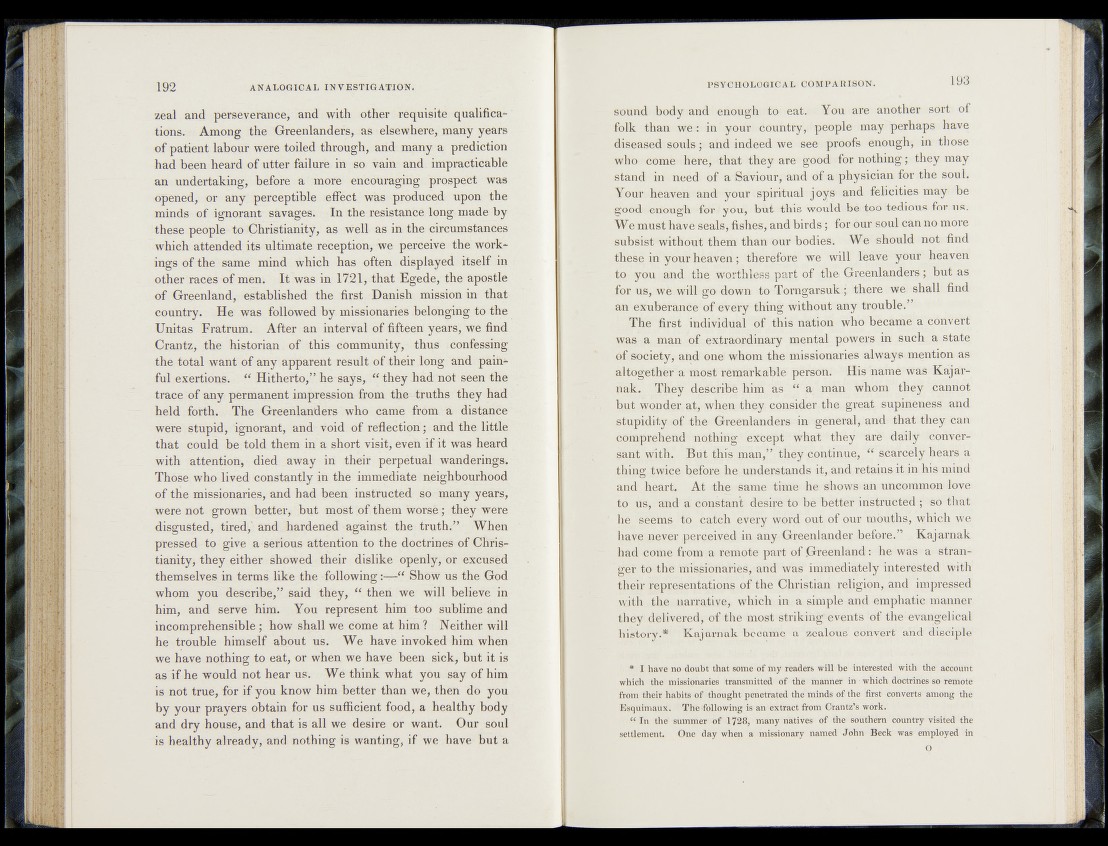
zeal and perseverance, and with other requisite qualifications.
Among the Greenlanders, as elsewhere, many years
of patient labour were toiled through, and many a prediction
had been heard of utter failure in so vain and impracticable
an undertaking, before a more encouraging prospect was
opened, or any perceptible effect was produced upon the
minds of ignorant savages. In the resistance long-made/by
these people to Christianity, as well as in the circumstances
which attended its ultimate reception, we perceive the' workings
of the same mind which has often displayed itself in
other races of mén. It was in 1721, that Egede, the apostle
of Greenland, established the first Danish mission in that
country. He was followed by missionaries belonging to the
Unitas Fratrunu After an interval of fifteen years, we find
Crantz, the historian of this community, thus ; confessing
the total want of any apparent result of their long and painful
exertions. ; “ Hitherto,” he says, “ they had not seen the
trace of any permanent impression from the truths they had
held forth. The Greenlanders who came from, a distance
were stupid, ignorant, and void of reflection ; and the little
that could be told them in a short visit; even if it was heard
with attention, died, away in théff perpétuai wanderings.
Those who lived constantly in the immediate neighbourhood
of the missionaries, and had been' instructed so many years,
were not grown better, but most .of them worse ; they were
disgusted, tired,' and hardened against, the truth.” When
pressed to give a serious attention to the doctrines of Chris-
tianity, they either showed their dislike openly, or excused
themselves in terms like the -following :—“ Show us the God
whom you describe,” said they, u then we will believe in
him, and serve him. You represent him too sublime and
incomprehensible; how shall we come at him? Neither, will
he trouble himself about us. We have invoked him when
we have nothing to eat; or when we have been sick, but it is
as if he would not hear us. We think what you say of him
is not true, for if you know him better than we, then do you
by your prayers obtain for us sufficient food, a healthy body
and dry house, and that is all we desire or want. Our soul
is healthy already, and nothing is wanting, if we have but a
sound body and enough to eat. You are another sort of
folk than w e r in ' y our country, people may perhaps have
diseased souls; and indeed we see' proofs enough; in those
who come, here, that they are good • for nothing; they may
stand in need of a Saviour, and of a physician for the soul.
Your heaven- and your * spiritual jo ^ s and felicities may^be
gooff •.enough for? you, but this w o u ld ;;be:too tedious for.-us.
We must have seals, fishes, and birds; for our soul can no more
subsist--without them than'our bodies: We should-not find
these in your Jleaven; therefore we will leave" ^our1 heaven
to you. and, the worthless^pa-rf ofrjthe- Gceerdapders; but ns
for us, we will go,- down to Torngarsuk.; there we. shall find
an exuberance of every thin'g without any trouble.”
The fifst individual of this nation who bec.^nid-^o'^yert
was a man of extraordinary mental powers in such, a state
©fi society, and one whom the missionaries always.mention as
altogether a most remarkable person. His^iame was Kajar-
nak. They deSGri^ him as/ “ a man - whom they cannot
but wonder, at, when they consider .the,,great -supineness and
stupidity.-of the Greenlanders in general,'and that.they can
comprehend n othingexcept what they are daily* Conversant
with.' But this rnan,” they continue, “ scarcely hears a^
thing twice before he understands it, and retains it in his-mind
and heart. At the same time he, shews an uncommon love
,t.o; ite, ’;affff a' constant desirWto' be beftcf .i dstrticted f sec that:,
he; seems to catch every word out of|jur mouths, which we-
h^ve never perceived in any- Greenlander.-,beforud’ Kajarnak
had come from .a remote part of .Greenland: he was a stranger
to the' missionaries, and was immediately interested with
their representations of,the Christian religion, and impressed
with the narrative,- which in. a simple and emphatic? manner?
they delivered-, of -the most striking1"©vents of the evangelical
hi&toH^* Kajarnak became a zealoiM cofiyert and dfisdijfle
* I have no doubt that some of my readers will be interested with th£' account
which the missionaries transmitted of the manner in which doctrines so remote
from their habits of thought penetrated the minds of-the first Converts among the
Esquimaux. The following is an extract from Gratttz’s work. -
“ In the sunxifier Of 1728, many natives- of the southern country iri&iied the
settlement. One day when a missionary named JdKri- Beck was employed in
O